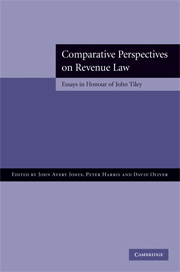Book contents
- Frontmatter
- Contents
- Contributors and affiliations
- Foreword by Dave Hartnett
- Foreword by Hugh Ault
- 1 A comparison of statutory general anti-avoidance rules and judicial general anti-avoidance doctrines as a means of controlling tax avoidance: Which is better? (What would John Tiley think?)
- 2 The judicial approach to avoidance: some reflections on BMBF and SPI
- 3 Comparing the application of judicial interpretative doctrines to revenue statutes on opposite sides of the pond
- 4 Abuse of rights and European tax law
- 5 The US legislative and regulatory approach to tax avoidance
- 6 The law of taxation and unjust enrichment
- 7 The history of royalties in tax treaties 1921–61: Why?
- 8 Land taxation, economy and society in Britain and its colonies
- 9 Meade and inheritance tax
- 10 Taxation, human rights and the family
- 11 Family connections and the corporate entity: income splitting through the family company
- Epilogue: Establishing the foundations of tax law in UK universities
- References
- Table of cases
- Table of abbreviations
- Index
7 - The history of royalties in tax treaties 1921–61: Why?
Published online by Cambridge University Press: 07 December 2009
- Frontmatter
- Contents
- Contributors and affiliations
- Foreword by Dave Hartnett
- Foreword by Hugh Ault
- 1 A comparison of statutory general anti-avoidance rules and judicial general anti-avoidance doctrines as a means of controlling tax avoidance: Which is better? (What would John Tiley think?)
- 2 The judicial approach to avoidance: some reflections on BMBF and SPI
- 3 Comparing the application of judicial interpretative doctrines to revenue statutes on opposite sides of the pond
- 4 Abuse of rights and European tax law
- 5 The US legislative and regulatory approach to tax avoidance
- 6 The law of taxation and unjust enrichment
- 7 The history of royalties in tax treaties 1921–61: Why?
- 8 Land taxation, economy and society in Britain and its colonies
- 9 Meade and inheritance tax
- 10 Taxation, human rights and the family
- 11 Family connections and the corporate entity: income splitting through the family company
- Epilogue: Establishing the foundations of tax law in UK universities
- References
- Table of cases
- Table of abbreviations
- Index
Summary
Introduction
John Tiley's breadth of interests and scholarship in matters of taxation is a disappearing art but makes it easy for friends to find starting points in his work for their own specialist eccentricities. History is fascinating to John and for a UK scholar working with the oldest income tax in the world, it is probably obligatory. Old income tax systems are generally schedular in nature and with schedules come many borderlines to draw; John has done his tours of duty surveying these borders, including the ones to be explored here. More to the point, John always wants to ask not only what the law is and where it came from but ‘Why?’. He has visited many other parts of the world in pursuit of solutions to why. Happily for me, his travels brought him to Sydney Law School to see our uncommon friend, Ross Parsons.
So an international cocktail is appropriate to celebrate Tiley's work and this one will mix the history of the tax treaty rule on royalties up to the emergence of the modern form, the borders of the provision and the fundamental question of ‘Why?’ we have it (viewed from an historical perspective). In the modern context of the Organisation for Economic Cooperation and Development (OECD) Model Tax Convention on Income and on Capital, with zero taxation at source on royalties, the ‘Why?’ is indeed a mystery.
- Type
- Chapter
- Information
- Comparative Perspectives on Revenue LawEssays in Honour of John Tiley, pp. 166 - 196Publisher: Cambridge University PressPrint publication year: 2008
- 1
- Cited by

